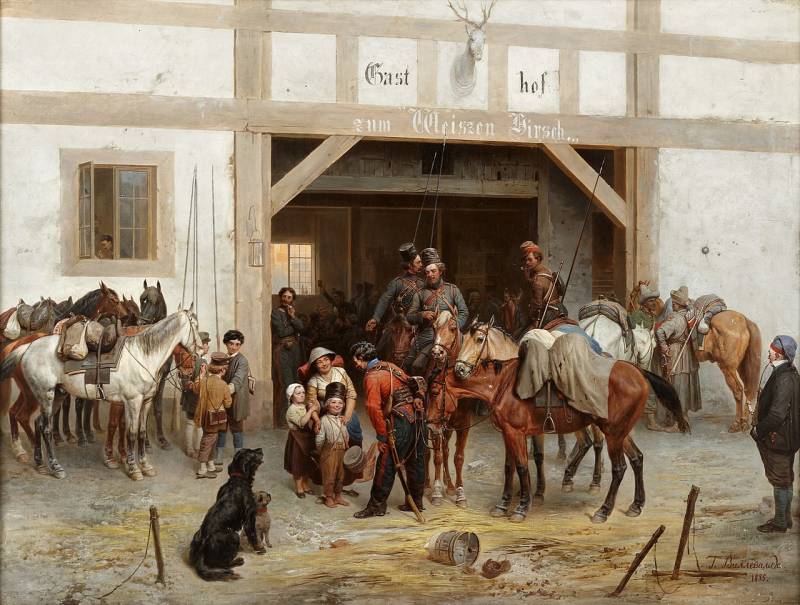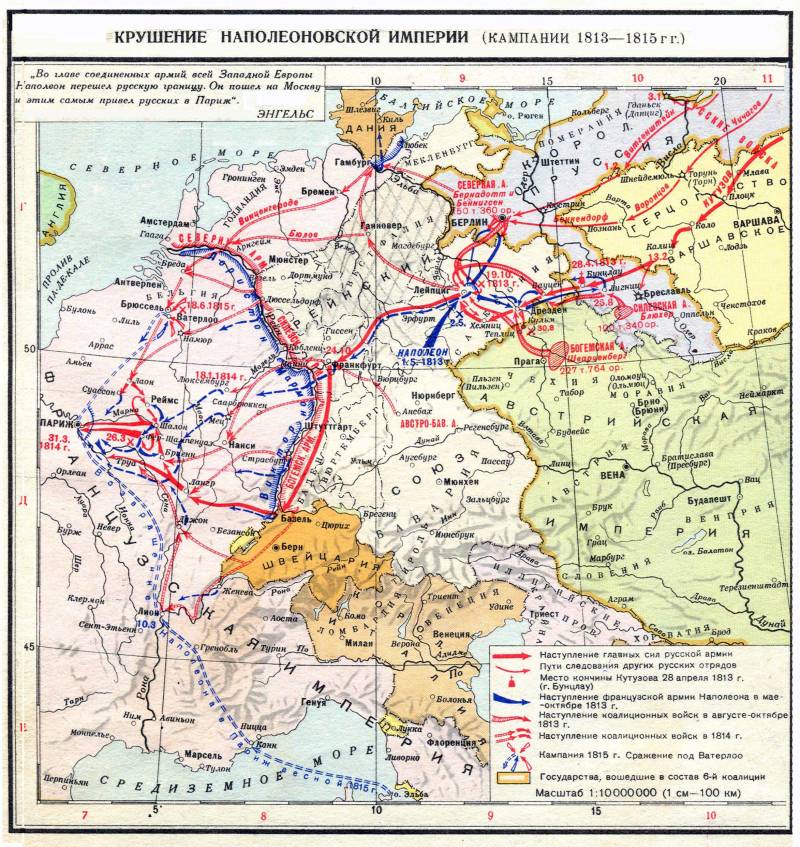How the Russian army ended up in Paris

Cossacks in Bautzen, 1813. Painting by Bogdan Villevalde
Napoleon creates a new army
On December 18, 1812, Napoleon was at the Tuileries. On the way, in a conversation with Caulaincourt, Bonaparte admitted his fatal mistake - an invasion deep into Russia:
The French emperor was again energetic and determined to continue the fight. War was his element, and Napoleon was actively preparing for a new campaign. The question was who would rise up against him and take the side of Russia. Will Austria remain neutral, what will Prussia do? It was necessary to create a new army.
The situation in France itself was dire. Thousands of families experienced the death of their fathers, brothers and sons. However, no one dared to oppose Napoleon.
The emperor quickly formed a new army. While still in Russia, Bonaparte ordered the recruitment of 1813 to be called ahead of schedule, and in the spring of 1813, 140 thousand people completed their studies. In 1812, the National Guard was created, now 100 thousand National Guardsmen have been included in the army. Citizens of older ages and young men of 1814 were called up. Several units were withdrawn from Spain. A number of categories of the population lost their deferments, the sailors were transferred to the infantry. A large number of troops remained garrisoned in Germany. Several thousand escaped from Russia.
In total, the empire could field up to 450 thousand people. True, most of them were scattered in various directions and stood in fortresses - Northern Europe, Spain, Italy, Germany. The field army consisted of about 180 thousand bayonets and sabers. There were also serious problems in supply, artillery, ammunition, and various materiel.
But Bonaparte was able to solve the main material issues by the beginning of the campaign.
A thin world is better than a good war
Napoleon would not have been averse to agreeing with Alexander. However, he was confident that he would defeat the Russians on the Vistula. He knew that the Russian army had also suffered heavy losses in the winter of 1812. Kutuzov during the march from Tarutin to the Neman lost almost 2/3 of the army. Most dropped out due to illness and frostbite. Artillery was badly damaged: out of 620 guns, only 200 remained. The pursuit of the enemy cost us dearly.
The ruler of France understood that Prussia was most likely lost. General York rebelled. King Friedrich Wilhelm, fearing the wrath of Napoleon, abandoned the rebellious general. But the Prussian public and the army were on the side of York. The French in Prussia were hated and longed for revenge. It was obvious that if the Russians entered Prussia, the king would either have to lead a war of liberation against France or abdicate.
Napoleon did not like the behavior of Vienna. Miloradovich signed a truce with Schwarzenberg, and on January 27 (February 8), 1813, Russian troops occupied Warsaw without a fight. Schwarzenberg withdrew his army south to Krakow, thus ending his participation in hostilities on the side of France. The Austrian emperor Franz (Napoleon's father-in-law) and the head of his foreign policy, Metternich, clearly did not want to fight the Russians. Vienna was looking for its benefits from the defeat of the Great Army in Russia.
Thus, Napoleon urgently needed to negotiate with Berlin, Vienna and St. Petersburg. Make concessions. So far, the main trump cards have been preserved. This allowed him to maintain the power of his dynasty. In particular, England wanted concessions on Spain, Russia, Prussia and Austria - the liquidation of the Duchy of Warsaw, Prussia - the withdrawal of French troops, financial benefits, etc.
Metternich in March wished to know the conditions under which Napoleon would agree to conclude a general peace, and could not achieve anything. Bonaparte still believed in his military genius, believed that he would achieve a great victory in the field and a world favorable to him. He did not see that the army was no longer the same, that the youths were already going into battle. France is drained of blood, weary of endless war. That his allies are already having doubts, and are negotiating with the enemies behind his back.
Russia continues the war
On December 26, 1812, the Russian sovereign Alexander I arrived in Vilna. The Russian commander-in-chief, the cunning Kutuzov, was against the continuation of the war outside of Russia.
Firstly, he understood that at the cost of Russian blood, Prussia and Germany would have to be liberated. And all the benefits will go to Prussia, Austria and England.
Secondly, the army was exhausted and bled dry by the hard campaign of 1812. And the enemy was still strong and dangerous. The French could rely on a network of fortresses on the Vistula, Oder and Elbe.
However, Emperor Alexander was implacable in this matter. Repeating his previous mistake - the confrontation with France, with which Russia did not have irreconcilable contradictions. The tsar believed that Russia should liberate Europe from the "Corsican monster". The mysticism of the emperor, who saw himself in the light of the savior of Europe, turned out to be above rational considerations.
Thus, Russia could stop, make a bad peace with Napoleon and leave European problems to Europe. It was obvious that Prussia, Austria and England would fight France in one way or another, pursuing their own goals. At that time, we could solve our national problems while the Europeans were fighting each other. Along the way, negotiate concessions from France, and from England, Austria and Prussia. However, Alexander decided to "save Europe" and thereby help England establish its economic, colonial empire on the planet.
It is worth noting that Kutuzov and several other sane military and statesmen who did not want to be the "cannon fodder" of England were in the minority. The main part of the capital's high society, the Russian nobility and officers wanted war. Part - was a victim of jingoistic propaganda, wanting to destroy the "Corsican monster", part - lived in the interests of Germany and England, part - wanted to avenge the invasion of 1812, finish off the enemy until he recovered and again led "twelve languages" to Russia.
Winter trekking
December 1812 the troops were resting. Alexander Pavlovich wanted to immediately throw the army on the offensive. But Kutuzov said that in this case the army would simply cease to exist. A campaign was announced for Christmas. The war was transferred to Prussia and the Duchy of Warsaw. The Russian command planned to defeat the flank French corps: Macdonald in Prussia, the Saxon-Polish-Austrian army in Poland. Also win over the Kingdom of Prussia.
On the northern flank, the Prussians did not resist. On December 30, 1812, Diebitsch persuaded York to agree to a separate truce. The demoralized French commander Murat surrendered command to Beauharnais and left for Italy. Beauharnais withdrew the remnants of the troops to Magdeburg. On January 4, 1813, Wittgenstein's troops approached Königsberg, which they took the next day without a fight. In the city, up to 10 thousand prisoners, sick and stragglers of the French were captured. Also, Russian troops in January blocked the garrison of Dangzig (35 thousand General Rapp, only a third were combat-ready) and Thorn (5,5 thousand soldiers of General Poatven).
On January 12, 1813, Kutuzov issued an appeal to the Russian army, beginning with the words:
The Russian army of Kutuzov (18 thousand soldiers) crossed the Neman, going to Plock, pushing the Saxon-Polish-Austrian troops beyond the Vistula. The vanguards of Miloradovich and Saken were advancing on Warsaw.
Schwarzenberg did not fight and led the army south to Krakow. On January 27 (February 8), 1813, the Russians peacefully occupied Warsaw. The Saxons of Rainier retreated to Kalisz, where they were overtaken by the Wintzingerode detachment. Under Kalisz, 16 Russians defeated 10 Saxons. Our losses - 670 people, the Saxons - 3 thousand killed and captured. The Duchy of Warsaw was knocked out of the states allied to Napoleon, although the Polish troops of General Poniatowski remained loyal to the French emperor and continued to fight bravely.
Thus, the Russian army easily broke into the enemy's first line of defense on the Vistula. This was due to the fact that there were few French troops here. The Prussian army observed a benevolent neutrality, intending to revolt against Napoleon, the Austrian Empire also de facto refused an alliance with France.
The start of the trip was quite successful. In January 1813, all of East Prussia was cleared of the enemy by Wittgenstein's troops. The Prussians greeted the Russians enthusiastically. Danzig and Thorn were blocked. The main forces of Kutuzov entered Warsaw, Schwarzenberg and Poniatowski left for Galicia.
Prussia begins to go over to the side of Russia. There are calls all over the country for arms, an uprising against the French, partisan detachments are formed following the example of the Russians. The Prussian king is forced to follow the army and the people. On February 16 (28), 1813, in the Polish city of Kalisz, Chancellor Baron von Hardenberg and Field Marshal Kutuzov signed an alliance treaty between Russia and Prussia against France.

Information